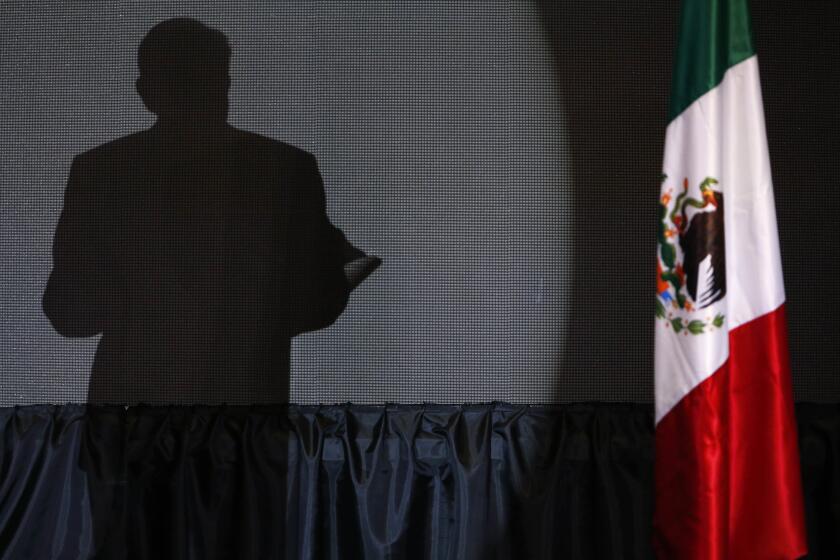CONTRAS: ‘We Won’t Turn Our Backs’ on Latin Fight, Bush Says : Reagan May Call on Congress for New Vote on Contras Aid
President Reagan plans to seek another vote in Congress soon on aid to Nicaraguan rebels, probably in the form of a proposal that fell two votes short of passage in the House this week, Administration officials said Thursday.
“We will be back and back and back until America does the right thing,” Vice President George Bush said in a television interview. “We are not going to turn our backs on those who are fighting for democracy in our own hemisphere.”
White House spokesman Larry Speakes vowed, “The President will not abandon his goal of finding funding for the freedom fighters in Central America.” Asked whether the Administration hopes to force another vote in the next few months, Speakes said, “If there’s a way to do it, we will.”
The Democratic-led House, in a series of votes Tuesday and Wednesday, rejected Reagan’s request for $14 million in aid for the contras fighting Nicaragua’s leftist regime--a major defeat for Administration policy in Central America.
‘Beginning of Victory’
However, a proposal endorsed by Reagan for humanitarian aid to the contras administered through the Agency for International Development instead of the CIA lost by only two votes, 215 to 213, leading some officials and Republican congressmen to conclude that it might pass on a second try. The Senate approved a similar measure by a vote of 53 to 46.
“We do not see (the votes) as a defeat in congressional action, but the beginning of a victory for the President’s policy in Central America,” Speakes said.
“I think if we could bring it up again, it would pass,” predicted California Rep. Robert J. Lagomarsino (R-Ojai), one of the Administration’s chief allies on Central America in the House.
But he said that the Administration and the House Republican leadership face a basic problem--there is no apparent way they can force a new vote.
“It’s not clear how we could do it,” Lagomarsino said. “We don’t control anything in the House. . . . There seems to be a division (among Republicans) on whether it can be done.”
Various Tactics Discussed
Speakes said that White House aides are discussing a variety of tactics with congressional leaders, and he suggested that it might even be possible to bring the Senate-passed resolution before the House by Tuesday under a special parliamentary rule. But both Republican and Democratic legislators said they doubted that such a tactic could work.
Some Administration officials and GOP congressmen believe that they might win a rematch on the issue if they emphasize the last-minute concessions Reagan made during this week’s debate, restricting the aid to “non-lethal” uses and taking its control away from the CIA.
But Speakes said that the concessions, offered only after it was clear that Reagan’s initial request for $14 million in military aid would lose, are no longer on the table. And the effort to resurrect the aid would still face dogged opposition from House Speaker Thomas P. (Tip) O’Neill Jr. (D-Mass.), who could probably keep any new bill off the House floor.
If these efforts fail, the Administration already has requested $28 million in funding for the contras in fiscal 1986, which begins Oct. 1. Congress is expected to take up that request in September.
Contras Vow to Go On
Meanwhile, contra leaders, who were in Washington to lobby for the aid, said their forces will fight on, supported by private donations.
“The debate in the Congress has resulted in a communist victory,” Alfonso Robelo, one of the rebels’ political leaders, asserted. “But the civil war in Nicaragua continues.”
Adolfo Calero, head of the Nicaraguan Democratic Force, the largest contra group, said that the loss of the $14 million was less important to him than what he called “the lack of resolve by the United States against a system that is communist and totalitarian.”
Meanwhile, the State Department dismissed a Sandinista announcement, made late Wednesday, that it is sending 100 Cuban military advisers home and releasing 107 political prisoners.
“The departure of 100 Cuban military advisers out of about 2,500 to 3,500 currently in Nicaragua is an event without significance unless it is part of a wholesale and fully verifiable reduction, and eventually termination,” spokesman Bernard Kalb said.
More to Read
Sign up for Essential California
The most important California stories and recommendations in your inbox every morning.
You may occasionally receive promotional content from the Los Angeles Times.











